Marvel’s putting out two comics with teenage Spider-Men in lead roles. Spidey features a young Peter Parker at the start of his crime-fighting career; Spider-Man serves to introduce Miles Morales into the newly revamped Marvel Universe. I was afraid that one book would be a carbon copy of the other but, thankfully, that’s not the case so far.
Spoilers follow.
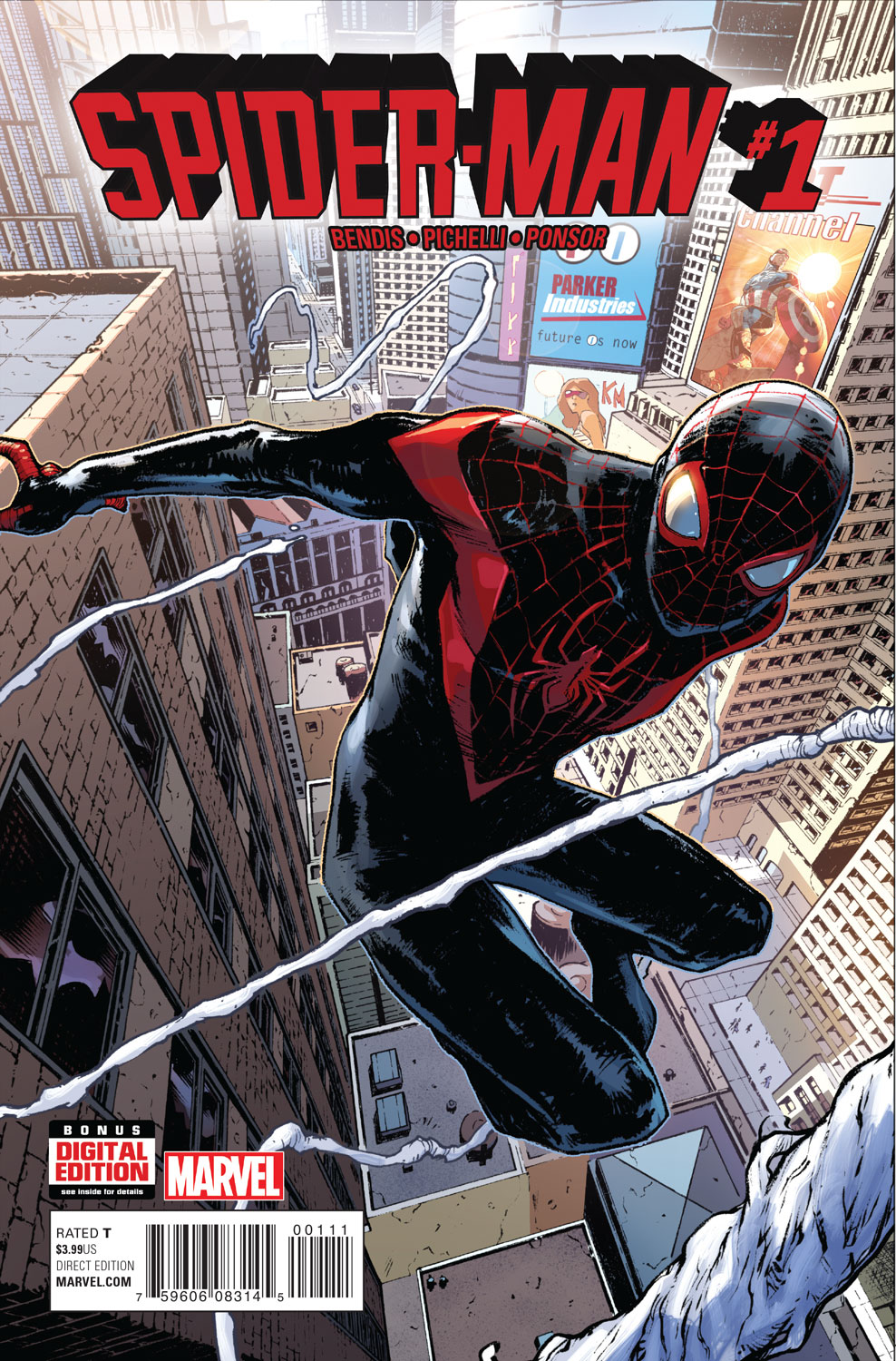
Miles Morales is the sole superhero survivor of Marvel’s Ultimate imprint, which presented an alternate reality populated by updated takes on classic characters. In that parallel dimension, Peter Parker died (and then came back) and Miles became the only Spider-Man fighting bad guys. But the events leading up to and playing out in the Secret Wars event series made Miles a citizen of the new mainline Marvel Earth. After an eight-month gap that’s yet to be shown, he’d join up with a new Avengers team and hang out with the original Spider-Man.
In Spider-Man #1 — by Brian Michael Bendis and Sara Pichelli — we see what Miles’ life looked like in that eight-month period. He’s still a student at an elite school for gifted kids but now his mother — who died at the hands of a supervillain in his native universe — is alive again. Aside from being a re-introduction to Miles and his best friend Ganke, this first issue seems designed to try and differentiate Miles’ version of Spider-Man from the Peter Parker model.
Sure, Miles has some of the same typical teenage concerns that Peter did. But, even then, they play out in ways that feel tuned to a different sort of persona. Take dating, for example.
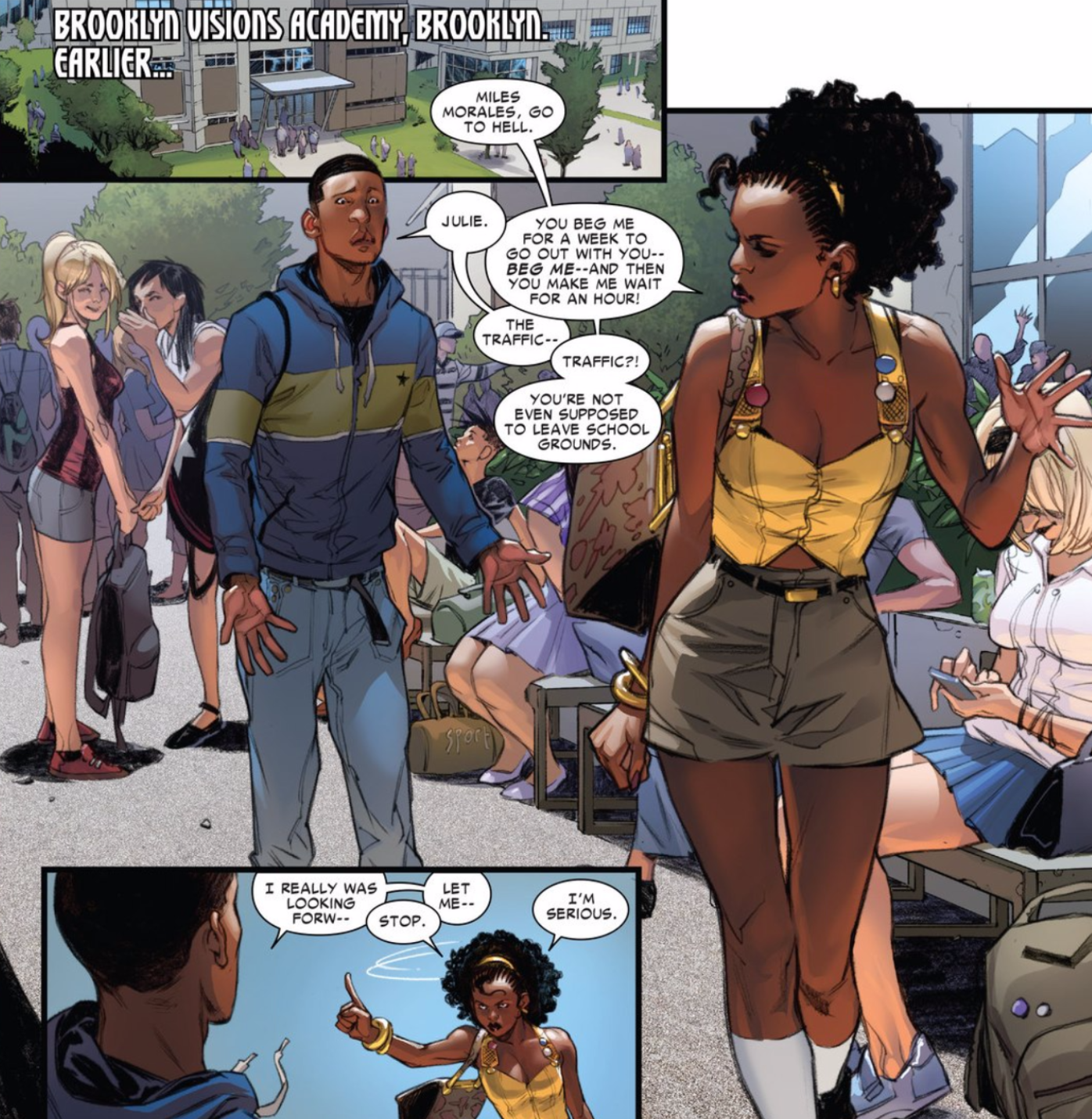
Miles has no problem asking a girl out. Furthermore, he’s pretty blunt about why he wanted to go out with her.
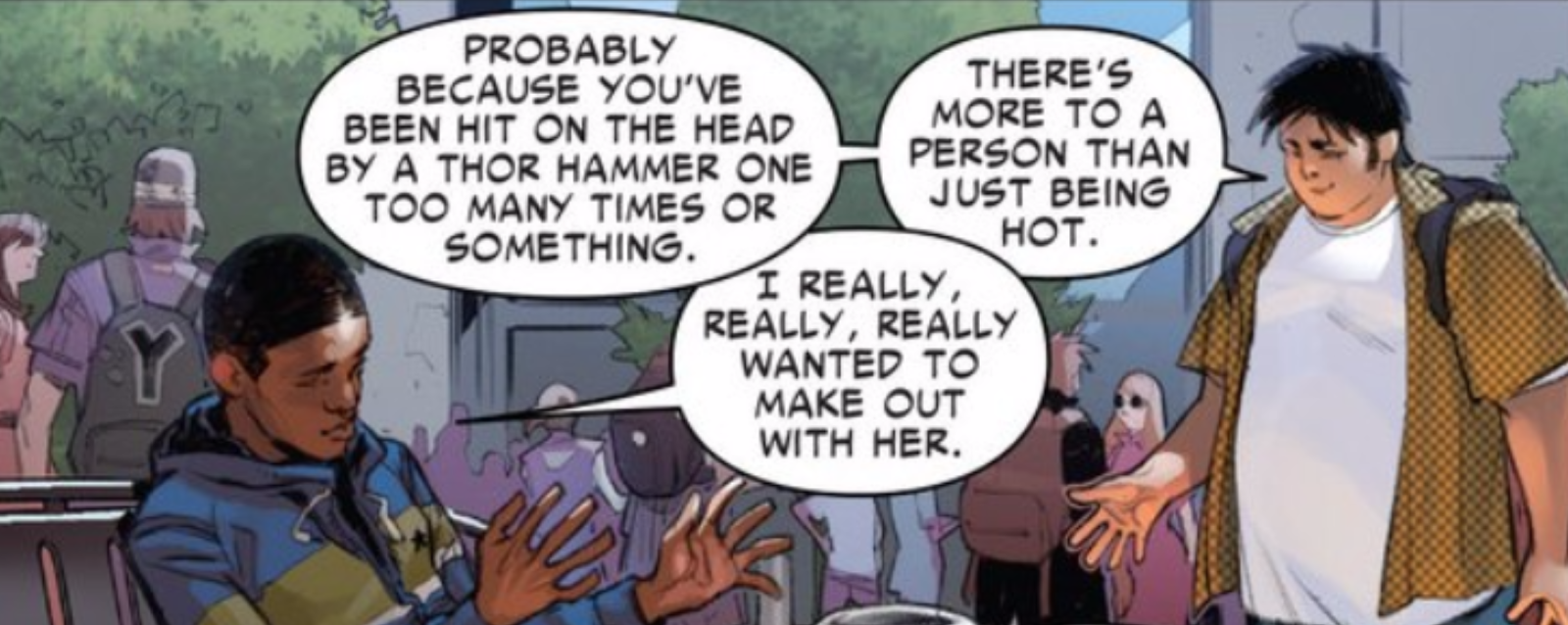
Compare that to scenes in Spidey #2, where Peter’s adorably nervous at the prospect of even being in the same room as Gwen Stacy.
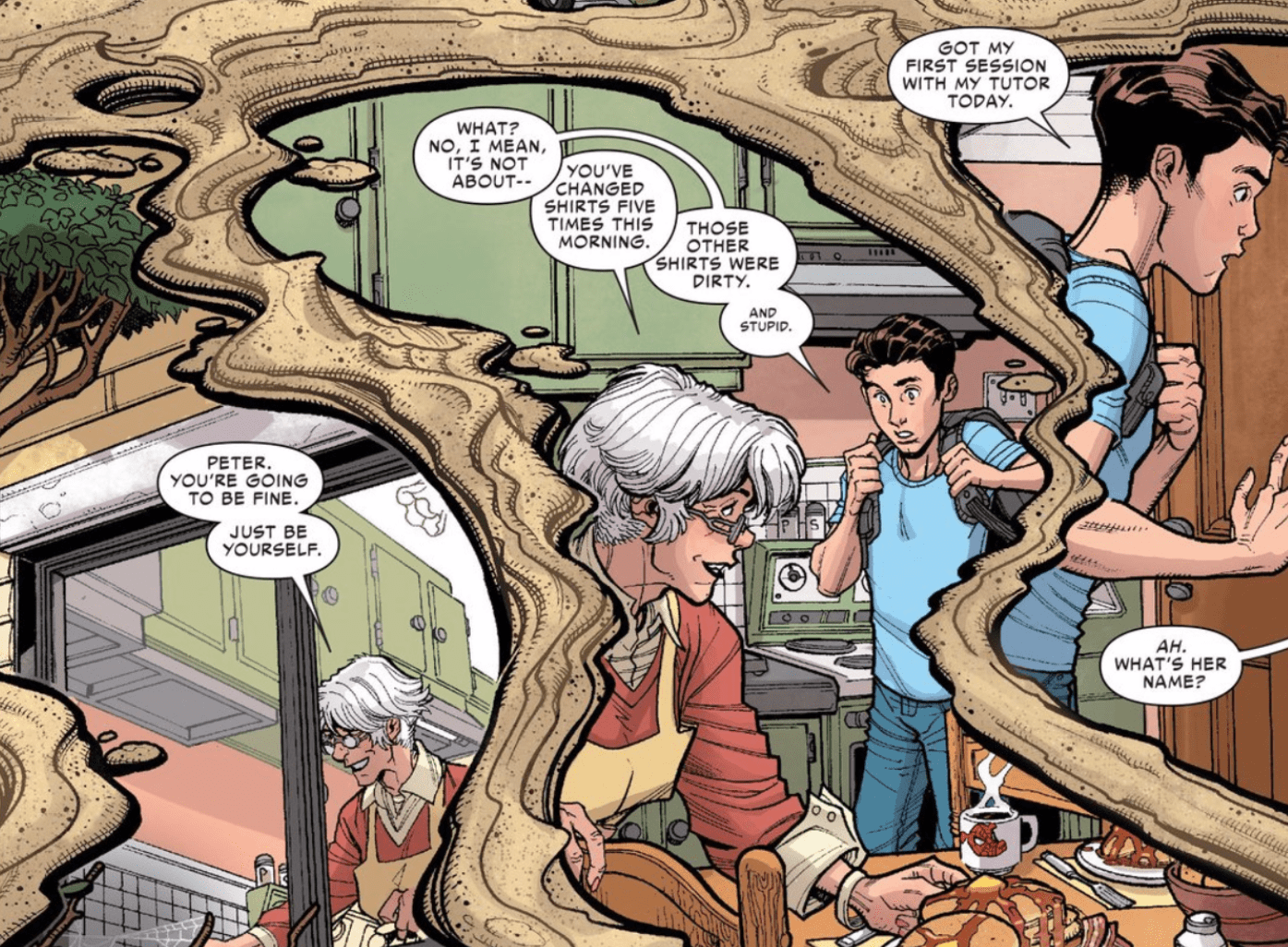
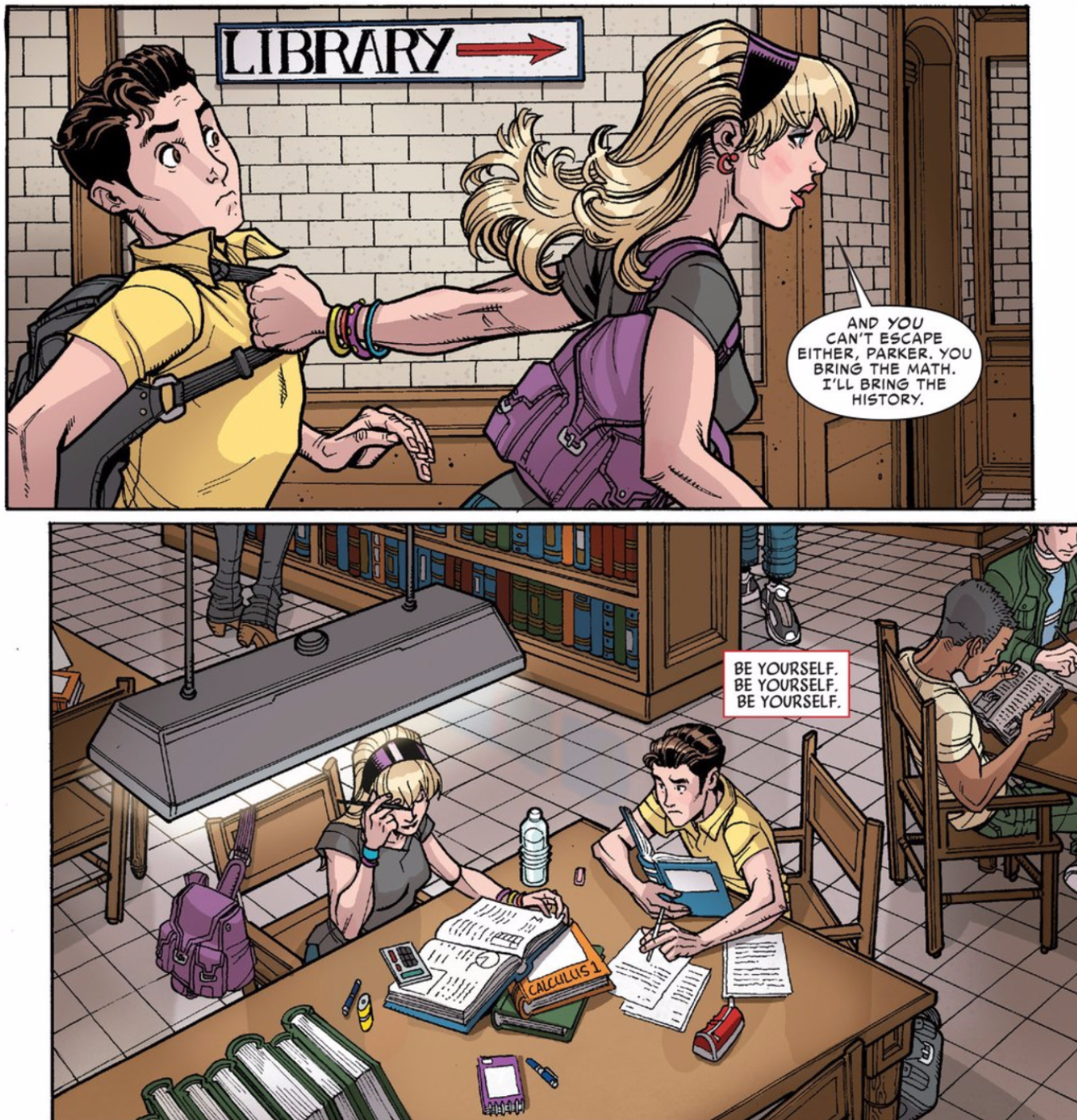
Spidey is a series that seems to exist solely for conservative, business-first reasons. Marvel’s movie-making division will be rebooting the Spider-Man film franchise with yet another white teenage wall-crawler. (Boo on that.) Marketing logic all but demands that they have a comic out with an analogous take. On top of that, some of Marvel’s readership have been cranky about the existence of Miles Morales and the fact that his creators dubbed him Spider-Man as opposed to something else. Spidey could be interpreted as a sop to those fans, especially the angrier portion who’ve said Miles isn’t “really” Spider-Man.
Speculative raisons d’etre aside, Spidey isn’t a bad comic. Robbie Thompson’s scripts are filled with first-person narration that makes Pete seem affably befuddled and Nick Bradshaw’s art shows a masterful control of composition, line weight and detail rendering. Every scene in Spidey has great little touches that make it clear that the book is a labour of love. However, the nature of that love relies on a shared nostalgia and a corporate need for an updated iteration of a flagship character.
When compared to the Peter Parker we get in Spidey, Miles Morales feels like an evolution of the Spider-Man formula. The commonalities between the two characters are important but the differences are more meaningful. Miles has both his parents, including a father who — along with his best friend — who knows his secret identity. He comes across as more capable of expressing his inner desires to people. Miles isn’t the miserable sad-sack loner that Peter Parker was in his initial Stan Lee/Steve Ditko appearances. Part of that is owed to how the craft of superhero comics writing has changed. As a device, the thought balloon is pretty much a relic of the past so we don’t get into Miles’ head quite the same way we did with Peter’s. As he’s written in Spidey, Pete isn’t quite as off-putting as in the earliest Lee/Ditko stories but not as comfortable with himself as Miles is either.
Even his way of ditching class to go be Spider-Man is different. When Miles’ attempt at invoking the time-honored bathroom excuse get shot down, he just gets up and walks out. There’s no nerdy mincing. He’s going to do what he has to.
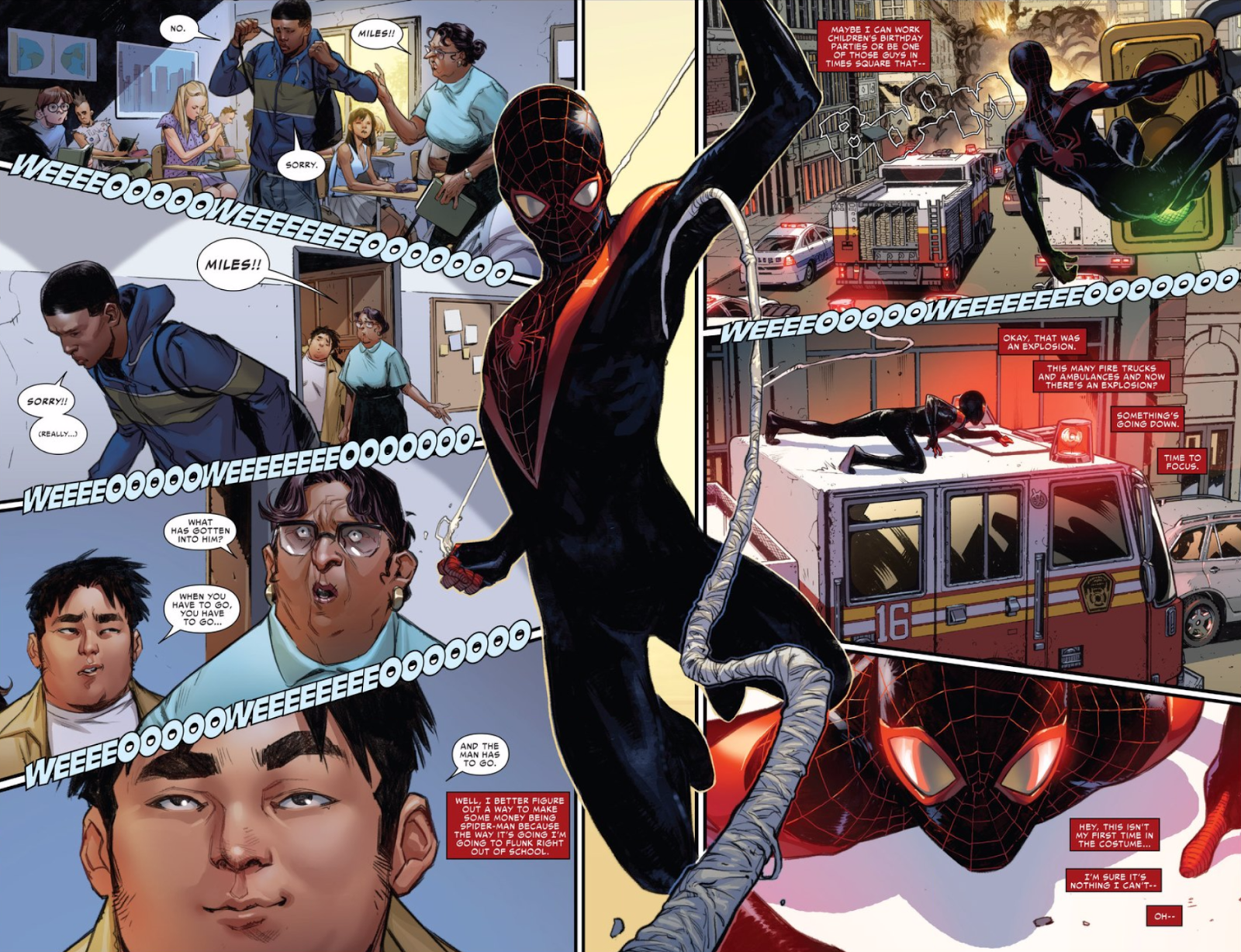
All these changes make it feel like Miles is doing the right thing because it’s the right thing, not because of guilt from a past mistake. For this Spider-Man, guilt isn’t a necessary ingredient. That’s a meaningful shift away from the reasons that drove Peter Parker to don his webbed super-suit. There are still loads of questions about the way Miles is being integrated into the Marvel Universe. Has his origin story changed at all? What counts as far as his previous personal history from the Ultimate Spider-Man comics? Those questions notwithstanding, Miles Morales feels like a teen Spider-Man for today. And as the last page of Spider-Man #1 shows, he’s going to have to reckon with his adult predecessor.
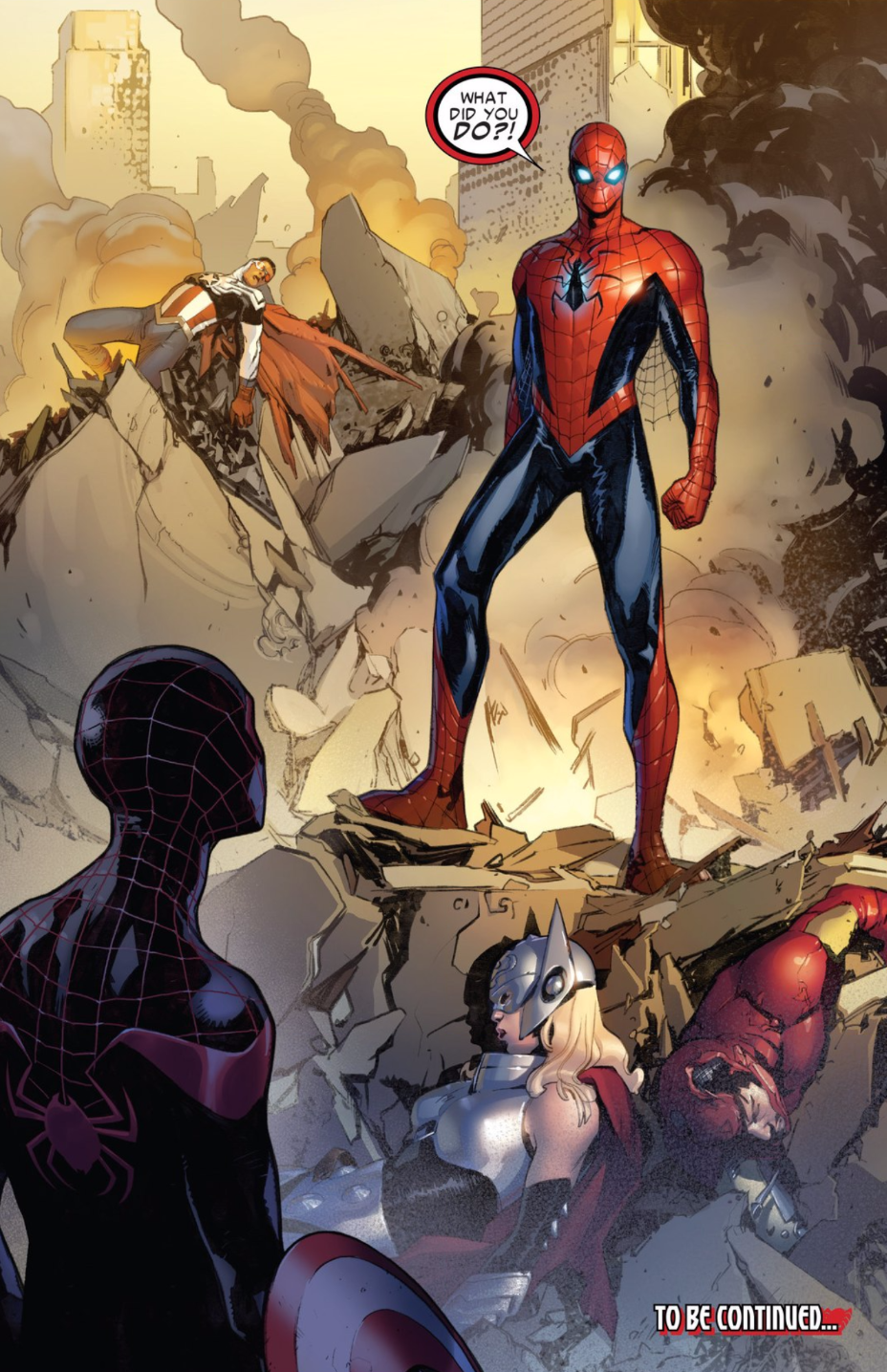
Should be fun.
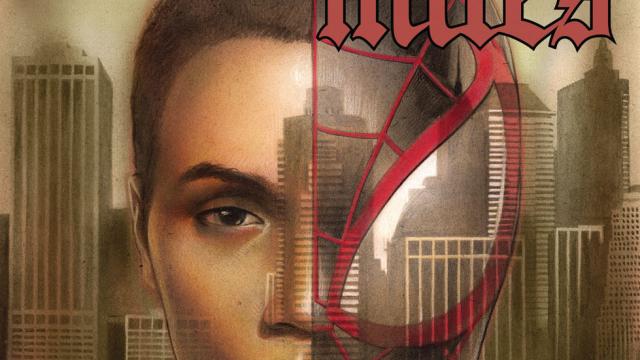
Comments
12 responses to “Sorry, Peter Parker, But Miles Morales Is The Better (Young) Spidey”
Miles: “I ONLY JUST SHOWED UP!!!!”
Kidding right? Everything about it is whack, especially that costume and character design… Best in the series are that gabriele dell otto’s ones. Mature peter parker with the most agressive spider man costume ever drawn.
I wouldn’t say better, its just a different take.
Oh not again with the “Spiderman should be black in the movies” jab again. No he shouldn’t.
Most movie-goers who see the Marvel movies have no idea that there are alternate universes where Captain America is black and Thor is a woman (I only know because of these articles as I never got into comics). Having him reintroduced in Civil War means his history will be minimal and it’ll be the same spiel we’ve heard. If you introduced Miles all you’d do is confuse the audience who know Spiderman as Peter Parker and waste too much of the Civil War movie explaining why the change has occurred.
Does that mean it should always be Peter? Of course not. I’d love to see this iteration make an appearance. But you have to give him the proper introduction and make his appearance matter. The way the MCU is going, we will eventually cover alternate universes and the passing of mantles. Hopefully then we can see a Miles iteration appear, but if you do it now you’re just having the non comic readers bite off more than they can chew.
Also, wait and see if the character has any longevity first.
If James Cameron had managed to film Spider-Man back in the 90s, it would have been complaints that Ben Reilly wasn’t in the movie instead.
Really? We’ve got Deadpool, Strange, Inhumans, Captain Marvel, half the characters in Suicide, and its a black Spiderman that gets you to worry about holding the viewer’s hand?
Kotaku really does seem to buy into alot of the changes Marvel does.
I feel like this is relevant to Mark Serrels’ interests somehow…
I think Ethan Ethics is even better.
Umm not to burst a bubble here but did the author get a different book than the rest of us? The way Miles’ life plays out due to him being a Spider-Man is a carbon copy of Peter Parker during his high school days in just about every Spider-Man media since his inception. Miles can’t get the girl because he misses dates due to fighting bad guys, his grades suffer because he’s fighting bad guys, his parents are yelling at him and he has no excuse because he’s actually fighting bad guys. It’s copy/paste Peter Parker from Amazing Spider-Man
So what place does this Spidey story has in the new Earth? It’s just supposed to be a remade flashback to the younger years of this Universe’s Peter Parker?
Am I the only one seeing the similarities between that first image and the cover of Nas’ illmatic?